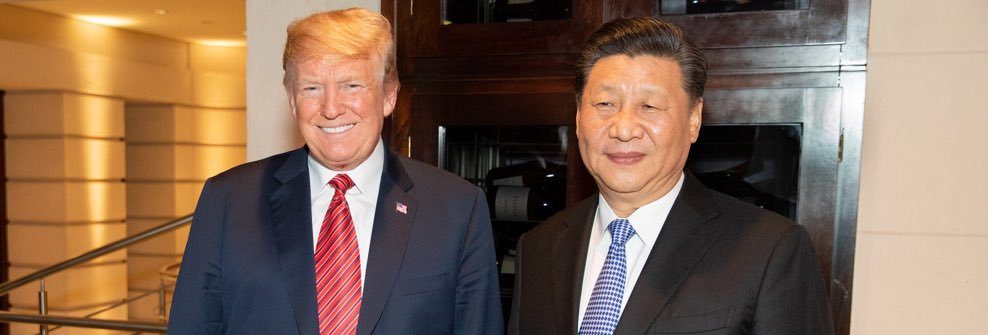

Donald Trump and Xi Jinping seem to have something in common, despite the showman image of the former and the statesman image of the latter. They both espouse nationalism. The showman as ‘Make America Great Again’ and the latter as the apostle of “Made in China 2025”.[1] The difference is in the presentation. For Trump, in what looks like a retreat from globalisation, it’s “bring back the jobs”; for Xi it’s about conquering world markets through companies like Alibaba and Huawei.
Part of the difference arises because the US economy is enormous and trade only accounts for 28% of GDP (2015) compared to China’s 40%.[2] Of these exports, ICTs account for 28% in the case of China but only 9% in the case of the US.[3] And in fact most of the ICT exports from China to the US are, like the iPhone, assembled in China from imported components.[4] Trump wants Apple to make more smartphones in the US, despite the higher costs and therefore higher consumer prices, while Xi wants to edge Apple and other US electronic giants out of pole position globally with Chinese 5G smart devices and other technologies. President Xi should thank President Trump for his assistance. For Trump, it’s all in the rhetoric and sound bites; for Xi it’s all in the 13th Five Year Plan, and the sound bites. Techno-nationalism is the common refrain.[5]
Techno-nationalism has never been far below the surface when it comes to ICTs, which is somewhat ironic considering the potential of ICT, such as the Internet, to enhance communications between nations and peoples. The history of mobile technologies is a good illustration. When 2G became Internet-enabled (2.5G) Europe, Japan, Korea and the USA were each struggling to ring-fence their own standards nationally, and have them adopted internationally. 3G seemed to bring an agreement that convergence of standards was necessary to achieve global economies of scale. China was late to the game, but jumped aboard with its own future version of 4G. Now China is determined to be a leader in 5G. Japan and Korea and even Europe seem to have fallen by the wayside, leaving the US and China to struggle for the prize money. Furthermore, China’s ambitions are to procure more of the parts and components, especially the semi-conductors, from domestic suppliers. Is this the beginning of the unraveling of international supply chain networks which have played havoc with the rules of origin of many traded goods, but which underpin the very meaning of globalisation?
Techno-nationalism is never more acute than in the arena of armaments, the development of which have always been at the technological frontier of ICTs. Lasers, armed robots, surveillance and attack drones are already yesterday’s technologies as far as the military R&D labs are concerned. There is an eerie reminder in all of this of George Orwell’s dystopian novel ‘1984’ in which the world is divided into three competing superpowers: Oceania, Eurasia, and East Asia. They are continuously changing their alliances, any two against the third as time passes by. But history stands still because the Ministry of Truth in each of them systematically rewrites the historical record, in school text books, stored newspapers, etc., such that whoever Eurasia, for example, is in alliance with it has always been in alliance with, or if it stands alone against the others it has always stood alone against the others. In today’s world of distributed Internet, it’s called Fake News and “alternative facts”.[6] There is a key difference between ‘modernism’ and ‘post-modernism’. In the former, invented history was centralised so it came in only a few versions, in the latter it has become decentralised and multifaceted, enabled by ICTs. [7]
Today’s version of the geo-political and military configuration could be stylised as China as a sea power, investing heavily in ultra-silent submarines, Russia as a land power parading its heavy-duty tanks and artillery missiles, and the USA as an air power, with President Trump complaining about how expensive are the latest updates to stealth bombers and fighter jets. Yesterday it was US and China friendship (the Nixon era) and Russia out in the cold, today it is Russia and China friendship and the US cold-shouldered. Tomorrow, maybe Trump’s admiration of President Putin. Perhaps his vulnerability to Putin’s ‘fake’ video evidence of his ‘fake’ peccadillos at Miss World, Moscow 2013,[8] will end up as the next International Reality Show and China the denounced currency-manipulator and worse. China’s efforts to establish political and military hegemony over the South China Sea (hence the submarines) is certainly a scene setter for the next chapter of international relations.
This already seems light years away from the world of the WTO free trade agreements, the IT Agreement,[9] and commitment to a global economy. But tell that to a Filipino fisherman, an unemployed US car worker, or a French taxi driver. History moves in waves it seems, and the tide of globalisation appears to be in an ebb. Lots of unpleasant debris is likely to be washed up until the next flow.
[1] https://www.focusnews.top/news-12614379.html see https://www.top-news.top/news-12614379.html
[2] https://databank.worldbank.org/data/reports.aspx?source=2&series=NE.TRD.GNFS.ZS&country=
[3] https://databank.worldbank.org/data/reports.aspx?source=2&series=TX.VAL.ICTG.ZS.UN&country=
[4] Lifewire (2016) ‘Where Is the iPhone Made?’ https://www.lifewire.com/where-is-the-iphone-made-1999503
[5] U.S.- China Economic and Security Review Commission (2016) Planning for Innovation: Understanding China’s Plans for Technological, Energy, Industrial and Defence Development
[6] https://www.salon.com/2017/02/04/separating-facts-from-alternative-facts-in-the-trump-era/
[7] As a trained historian, let me emphasize the difference between interpretation and invention.
[8] https://www.theguardian.com/us-news/2017/jan/11/trump-russia-dossier-explainer-details
[9] https://www.wto.org/english/tratop_e/inftec_e/inftec_e.htm